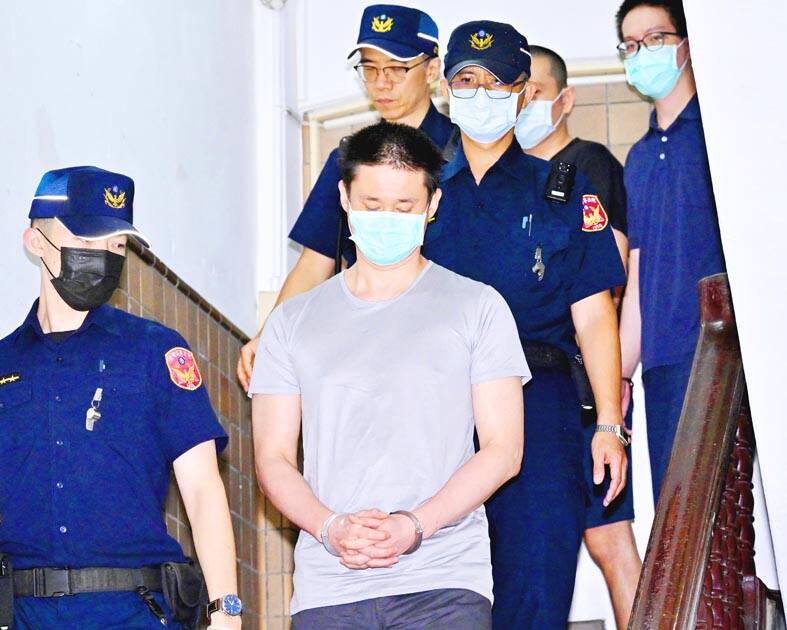The High Court yesterday convicted eight current and retired military officers for developing a spy network for China, including a failed plot to fly a CH-47 Chinook attack helicopter to a Chinese aircraft carrier in the Taiwan Strait.
The defendants received sentences ranging from 18 months to 13 years for contravening the National Security Act (國家安全法), the Criminal Code of the Armed Forces (陸海空軍刑法) and taking bribes.
The defendants were with key military sites, including the 601st Brigade of Aviation and Special Forces Command and the Huadong Defense Command.

Former Aviation and Special Forces Command Lieutenant Colonel Hsieh Meng-shu, center, is escorted by officers at the High Court in Taipei yesterday.
Photo: Tu Chien-jung, Taipei Times
The initial investigation was conducted by the High Prosecutors’ Office, which received reports about two Taiwanese businessmen working in China, Chen Yu-hsin (陳裕炘) and Hsieh Ping-cheng (謝秉成), both retired army officers who were recruited by Chinese intelligence officers with promises of financial rewards to form a spy network in Taiwan among their friends and former colleagues in active service.
Beginning in 2021, Chen and Hsieh recruited several officers, including a trio serving at the Aviation and Special Forces Command — Lieutenant Colonel Hsieh Meng-shu (謝孟書), and junior officers Kang Yi-pin (康奕彬) and Ho Hsin-ju (何信儒) — as well as army Major Hsiao Hsiang-yun (蕭翔云) and junior officer Hung Jui-yang (洪睿洋).
Hsiao received NT$620,000 (US$19,396) from Chinese agents, while Kang received NT$700,000 and Ho NT$600,000 for obtaining and handing over classified military material, investigators said.
The Chinese agents sought classified material on troop deployments and Han Kuang drills, investigators said, adding that the most audacious plot was a reward of US$15 million promised to Hsieh Meng-shu, a military helicopter pilot and a special forces wing commander, to defect.
Hsieh Meng-shu agreed to fly a Chinook helicopter using the cover of a military exercise in June last year, they said.
The estimated 15-minute flight was to have ended on the Shandong aircraft carrier on the western side of the Taiwan Strait, they said.
However, a tip-off led to the arrest of Hsieh Meng-shu and his coconspirators before the plan could be carried out, investigators said.
Two junior officers in the spy network, Lu Chun-fang (陸駿方) and Wu Chih-peng (吳志鵬), received money from Chinese agents for filming themselves saying: “In time of war, I agree to surrender to the Chinese People’s Liberation Army,” the prosecutors’ office said.
The High Court judges sentenced Hsiao to 13 years in prison, Hsieh Meng-shu to nine years, Hsieh Ping-cheng and Hung to eight years, Ho to seven years and four months, Kang to seven years and two months and Lu to five years and six months, while an active service soldier surnamed Liu (劉) was handed an 18-month sentence. Wu was found not guilty.
Chen, a retired military officer who was recruited while working in China, could not be located and had likely fled to China, prosecutors said, adding that an arrest bulletin had been issued for him.
The Ministry of National Defense said in a statement that China has targeted Taiwan’s military and personnel for infiltration and espionage, so all units must enhance national security education and training to safeguard information.
All personnel must protect classified material, report suspicious activities promptly and cooperate with officers to prevent infiltration by spies, the ministry added.
Additional reporting by Wu Che-yu
Source: Taipei Times - Editorials 2024/08/23




















